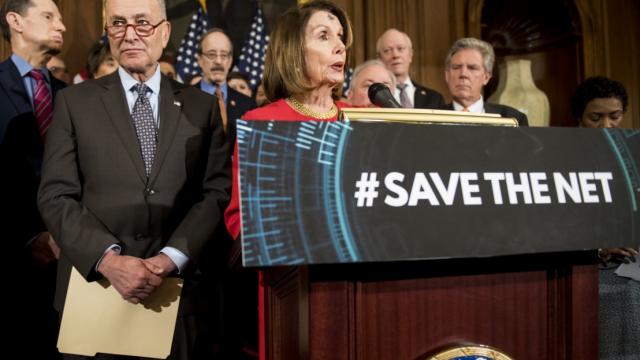
Democrats in Congress on Wednesday introduced a net neutrality bill that would fully restore the Obama-era rules that were repealed by the FCC's current Republican majority.
The "Save the Internet Act" is just three pages long. Instead of writing a new set of net neutrality rules, the bill would nullify FCC Chairman Ajit Pai's December 2017 repeal of the FCC order passed in February 2015 and forbid the FCC from repealing the rules in the future.
"A full 86% of Americans opposed the Trump assault on net neutrality, including 82 percent of Republicans. That's hopeful," House Speaker Nancy Pelosi said at a press conference announcing the bill today. "With the Save the Internet Act, the Democrats are honoring the will of the people."
"People understand that their ISPs have far too much control over their connection to the Internet and the services they care about," Rep. Mike Doyle said. "Whether it's slowing down Netflix, blocking access to innovative mobile services, or adopting anti-competitive zero-rating policies, the track record for ISPs on this issue is clear. And consumers and small businesses want the protections and certainty that strong net neutrality rules provide."
Bill faces uphill battle in Senate
If the Democrats' bill becomes law, home Internet and mobile broadband providers would once again face common-carrier regulation under Title II of the Communications Act, including prohibitions on blocking, throttling, and paid prioritization. The bill is therefore nearly identical to one that was approved by the U.S. Senate in May 2018 but never voted upon by the House.
This time around, there's a strong chance the bill could pass in the House but not the Senate. Democrats won a House majority in the November 2018 elections, so they can ensure that their net neutrality bill will receive a full vote in that chamber. But forcing a vote in the Senate will require more cooperation from Republicans than last year.
Last year's legislation was a Congressional Review Act (CRA) resolution, a type of bill that gets some special parliamentary privileges. Despite being the minority party, Democrats were able to force a vote of the full Senate with a discharge petition and ultimately passed the bill with the help of three Republicans who voted for it.
But CRA resolutions that nullify an agency decision can only be passed in the same Congressional session in which the agency decision was made. Because a new Congressional session began in January, a CRA resolution nullifying Pai's December 2017 repeal order is no longer an option. This time, Democrats had to file a regular bill that must go through the normal committee process, which in the Senate is still controlled by the Republican majority. Even getting a simple majority will be tougher than last year because Republicans gained two seats in the Senate and now hold a 53-47 advantage.
"Last spring, our colleagues in the United States Senate were given the choice to side with the average person rather than big special interests," Senate Minority Leader Chuck Schumer said today. "Unfortunately, all but three Senate Republicans voted on behalf of special interests, but Democrats voted on behalf of the American people... now we have a Democratic House and Republicans will have a second chance to right the Trump administration's wrong."
Pai and broadband industry fight bill
Republican leaders in Congress have consistently opposed the FCC's 2015 net neutrality rules and supported Pai's repeal of those rules. Republicans have pledged support for some type of net neutrality law, but not one as strong as the repealed FCC rules.
Today, Democrats accused Pai's FCC and Congressional Republicans of ignoring Americans' pleas to maintain net neutrality.
"Average folks understand that they do not want their costs of using the Internet to go up, and they do not want their freedom to be constricted," Schumer said. "If they should decide to start up a business, they want to be on an equal playing field with the big boys. There are so many reasons we need net neutrality."
While consumer advocates and providers of Web services welcomed the Democrats' legislation, free-market think tanks and broadband industry lobbyists that generally oppose regulation of ISPs are already fighting against it.
Pai railed against the Democrats' bill in a statement claiming that his net neutrality repeal should remain in place because it "has unleashed private investment, resulting in more fiber being deployed in 2018 than any year before and download speeds increasing by an astounding 36 percent." In reality, FCC data on Internet speed only goes up to the end of 2017, so it doesn't show any increase after the net neutrality repeal, and broadband deployment during Pai's term has continued at about the same rate as in the Obama administration. The new fiber builds touted by Pai were also largely from projects that began during the Obama years, including an AT&T project that was mandated by the FCC in 2015.
Originally published by ArsTechnica
















